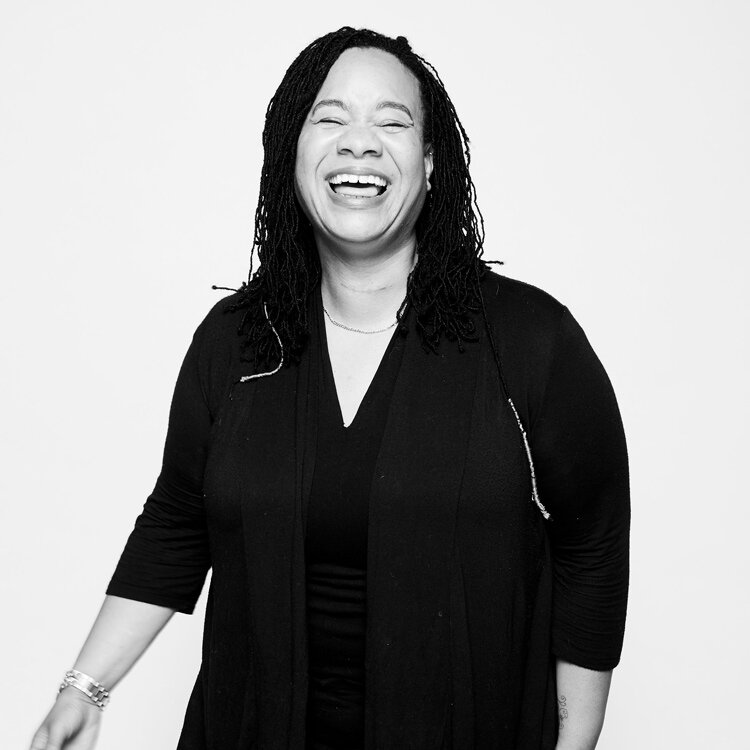
Doula and Executive Director of
SisterWeb Doula Collective
– Marna
SisterWeb is a community doula network. We match doulas of color with peer families of color—specifically Black, Latinx, and Pacific Islander families living in San Francisco—at no charge to the families.
My pregnancy story is what started and inspired my work. My daughter was born at 36 weeks and she was very small and underweight. She was four pounds, twelve ounces. Technically, she [was] healthy, but because she was so small she stayed in [the] NICU for about a week. I had the experience of not taking my baby home and going back and forth to the NICU. It’s very stressful… I have a huge family; I have lots of support and I still felt alone. That was just one week, so I can only imagine what someone who has to do weeks or months in a NICU [has to go through]. I still went through things because I was having complications, and it was very difficult at times for me.
And though I had family, I thought about the women who did not have any support and I thought, ‘maybe I can help someone else do this. I think I could be helpful if they’re having a difficult time.’ I didn’t know that [this profession] was a thing. I just was… always interested in birth and all the stuff that went along with it. So, I attended a couple of deliveries. I was at [a] birth and the nurse told me that it was a profession and it was called a doula. After some time, I pursued being a doula. In training, I learned about birth outcomes and health disparities. I knew Black and brown people [had] the worst outcomes, but I had no idea [how] many people died. I thought that that was something that happened in the past, not today. It was an eye-opening experience.
An equally eye-opening experience is how hard it was to be compensated for doing doula work. I remember when I hit rock bottom. I supported a mom with a week-long birth. I wasn’t paid for the support but I love my work, and I remember the joy when she finally had the baby. I left the hospital and came home to find a final notice on my door and I just hit rock bottom. I just cried uncontrollably. And I was like, ‘I love this work [but] I’m not going to be able to do it because I have to do something else to generate income.’
I ended up meeting a woman, who identifies as white…who was also a doula and couldn’t understand why I wasn’t being paid. She doula-ed for a lot of wealthy white families, but she also worked a lot in communities of color. So she was like, ‘We need to do this. We need to start this organization. We need to figure [it] out…’
My passion became to organize a way to figure out how to get doulas compensated. That’s how our organization, SisterWeb, formed. We were like, ‘doulas need to be paid. They need to be dignified.’
There is a balance of finding enough money to pay people…what they need to be paid. It’s not easy, but I love it…I have a fantastic, awesome staff. They’re an incredible team of people. I couldn’t do any of this if they weren’t a part of it, it’s just a great work environment, and it’s important. We get to help inform people. We get to help families. We get to help save lives.
We don’t want to be one of those programs that is gone in a few years because of funding, so we’re trying to think strategically about it and figure out sustainable funding and finding those income streams. Our biggest challenge is coming up against other groups [that say] they’re centering Black people and brown people and people of color, but they’re not really. But that’s our competition. We’ve begun to solve the problem, bring more doulas of color to people of color. I would hope that people want to partner more with us, use us, and pay us for the wonderful life-changing work we can do.
People [ask] us to do extra stuff, ‘Oh, great, we’d love for you to do this and we’d love for you to do that. Can you do this additional case management?’ but don’t want to pay us for it, and it’s like, we would love to do some of that stuff, but it [has] costs. Then they want to pay for the birth, but they don’t want to pay a doula to do their work. Sometimes, we’re doing stuff nurses are doing, but we’re not even getting a fraction of a nurse’s pay. That’s unfair, so then it becomes like, ‘You’re going to ask people of color to do underpaid work again?’
That’s not the path to birth justice. Birth justice is having people understand all of their options and know how to ask for them appropriately. When they’re offered interventions, they know what they’re getting into, you know, informed consent, and feel supported and feel that there’s someone there to help them through this time in their life. It’s about normalizing what birth looks like and birth experiences, good and bad. It’s about having someone, if you’d like, that looks like you to provide you comfort if you are already dealing with other challenges—like housing and food insecurity—and all of that stuff that affects our Black preterm births and infant and maternal mortality rates.
Normalize all aspects of pregnancy and labor. It’s messy, it could be confusing, it could be scary, it could be joyful, could be a range of things, and that’s okay. With doulas, we’re here for you to have all of that, and we’re not going to judge you. That’s birth justice.